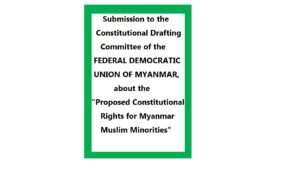Author: Dr. Ko Ko Gyi @ Abdul Rahman Zafrudin
I. Context and Urgency
Myanmar remains trapped in a cycle of prolonged civil war and revolutionary conflict. Since independence in 1948, the country has endured successive waves of armed resistance and political instability:
- The Communist Party of Burma initiated its first insurgency in Paukkongyi, Bago Region, on 2 April 1948—less than three months after independence.
- The Karen National Union (KNU) began its armed struggle against the central government in early 1949.
- Arakanese nationalists led by the monk U Seinda and Muslim Mujahideen groups in Rakhine State launched simultaneous uprisings.
- In 1949 Naw Seng, a Kachin captain in Kachin Battalion 1 joined KNDO. After Buddhism state religion on 26 August 1961, Kachin Independence Army increased the rebellion.
- The military coup on 1 February 2021 triggered widespread peaceful protests, which were met with violent suppression, sparking the Spring Revolution.
Without a negotiated peace, Myanmar risks further fragmentation, with armed factions continuing to emerge and civilians bearing the brunt of the suffering. A comprehensive and inclusive peace process is essential to prevent state failure and to build a resilient federal democracy.
Strategic Peace Roadmap (2025–2030)
Phase I – Ceasefire and Confidence Building (2025)
Lead Facilitators: Malaysia, ASEAN, United Nations Supporting Guarantors: China, United States, European Union, Japan, India, Norway, Switzerland, OIC
Key Actions:
- Immediate cessation of hostilities
- Designation of “safe humanitarian corridors”
- Deployment of ASEAN and UN ceasefire and humanitarian monitoring teams
- Release of detainees and political prisoners
- Convening of a “Pre-Talks Roundtable” in Malaysia with representatives from:
- National Unity Government (NUG)
- Military Council
- Ethnic Resistance Organizations (EROs)
- People’s Defense Forces (PDFs)
- Religious minority leaders
- No immediate demand for disarmament nor surrender—focus on temporary de-escalation
Phase II – Federal Negotiations and National Convention 2.0 (2026)
Guiding Principles:
- Spirit of the 1947 Panglong Agreement
- Foundational principles of federal democracy
Core Topics:
- Drafting a federal democratic constitution with genuine power-sharing
- Guaranteeing religious freedom and anti-discrimination protections
- Safe repatriation and reintegration of displaced persons and refugees
- Establishing a transitional justice mechanism
- Signing a temporary ceasefire agreemen during the convention period
Phase III – Formation of Myanmar National Unity Transitional Government (2027–2029)
Inclusive Representation:
- Civilian political leaders (NUG, NLD, independents)
- Ethnic and religious representatives
- Reformed military personnel and veterans
Conditions:
- No veto power for the military
- ASEAN, UN, China, and the US may appoint advisory delegates
- Establishment of joint commissions for:
- Economic recovery
- Anti-corruption
- Military reform under civilian oversight
- Citizenship review (including Rohingya)
- Constitutional drafting – to develop a new federal democratic constitution that reflects inclusive governance and long-term stability
Phase IV – Free and Fair Elections (2030)
- Postpone the military’s proposed 2025 elections until 2030
- Conduct elections under international observation
- Guarantee universal suffrage regardless of ethnicity or religion
- Establish a permanent civilian government under the new federal constitution
- Explicit constitutional prohibition of future military coups
- Ensure accountability and justice mechanisms
Federal Democratic Union of Myanmar – Constitutional Framework
To ensure long-term unity and stability, the Federal Democratic Union of Myanmar shall be guided by the following principles:
(a) Transitional Federalism:
- A federal system shall be implemented for a minimum of ten years
- After this period, constituent states may be offered the option to transition into a Con-Federation model
- Secession shall not be permitted under any circumstances
(b) Full Democracy with Safety Nets:
Democratic governance shall be accompanied by robust social safety nets
- These shall include protections for vulnerable populations, equitable access to services, and inclusive economic development
Transitional Justice and Security Sector Reform
Amnesty during the transition period only for those who accept ceasefire and truth-telling
- Adopt Truth and Reconciliation Commission (TRC) models from South Africa and Rwanda
- Investigate and document grave crimes (e.g., Rohingya genocide, war crimes)
- Conditional clemency for those who confess and seek reconciliation
- Provide reparations, psychological and medical support to victims
Disarmament, Demobilization, and Reintegration (DDR):
All armed groups to submit voluntary lists of eligible personnel for DDR
- Support reintegration and livelihood programs for ex-combatants
- Establish a new inclusive national army under democratic civilian control
- Local police forces to be placed under respective regional governments
Economic Reconstruction Plan
- Review and audit all military-era and Chinese-backed projects
- Approve only those aligned with international standards and national interest
- Launch a USD $10 billion Reconstruction Fund
- Seek contributions from ASEAN, Japan, US, EU, World Bank, OIC, and China
- Encourage return of overseas Myanmar nationals through investment incentives and long-term residency visas
- Promote green economy and job creation
- Offer vocational training for ex-combatants and youth
Diplomatic Recommendations for Stakeholders
China:
- Prioritize border stability, Belt and Road Initiative continuity, and limit US influence
- Apply pressure on Myanmar’s military regime to engage in peace talks
United States and Allies:
- Focus on halting war crimes and ensuring humanitarian access
- Support political and economic cooperation without requiring full NUG victory
- Engage in joint ventures for rare earth and natural resource development
- If President Donald Trump and Prime Minister Anwar Ibrahim jointly pressure China to support peace efforts, their leadership could potentially be recognized with a Nobel Peace Prize
ASEAN:
- Address regional stability, refugee flows, and irregular migration
- Take responsibility both within member states and inside Myanmar
Russia:
- May continue arms trade but should refrain from disrupting negotiations
NUG/NLD:
- Accept shared governance with ethnic groups
- Recognize that full removal of military influence may not be immediately feasible
Military:
- Must accept reduced authority under democratic civilian rule
- Individuals seeking political office must resign from military service
ERO/PDF:
- Retain territorial defense rights and federal autonomy
- Accept inclusion in the Union government and shared governance
Ethnic and Religious Minorities:
- Guaranteed citizenship, dignity, and equal rights
Conclusion
Myanmar stands at a historic crossroads. After decades of bloodshed, a new dawn is possible. The sound of gunfire is slowly being replaced by calls for peace and justice. A federal democratic future is within reach.
The next decade must be one of unity, dignity, and peace—especially for the generations to come. It is time to build a new nation together, where all communities coexist under the rule of law, guided by integrity, compassion, and reconciliation.
Note: This proposal has been submitted solely by the author (DARZKKG) to ASEAN, the Government of Malaysia, and the Ministry of Foreign Affairs. It has not been officially endorsed by any organization.
Clarification: This proposal does not support the military’s 2025 election plan. The recommended election is to be held in 2030 under a newly ratified federal constitution, ensuring free, fair, and just democratic governance.






